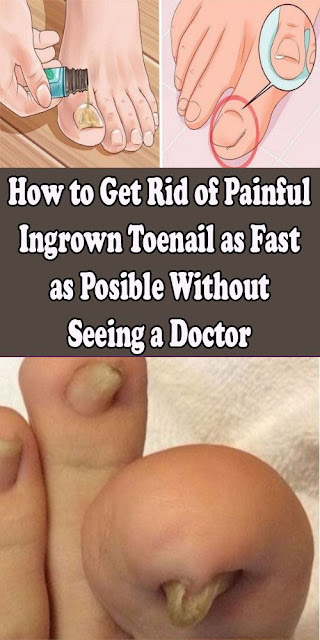The ingrown toenail or onychocryptosis is an annoying and especially very painful problem. . In some cases, surgery is inevitable to treat the ingrown nail, while in others, it is possible to remedy it naturally.
Ingrown toenails can be related to various factors:
- The deformation of the nail (nail in the form of clamp)
- Thickening of the nail
- Trauma (shock)
- Cutting nails too short
- Wearing too narrow shoes that crush the nail
- Taking Acne Treatments Containing Isotretinoin
Note that people with diabetes or any other disease that causes poor blood circulation are more likely to develop an ingrown toenail.
What are the symptoms of an ingrown toenail?
It should be noted that the evolution of this problem can be divided into 3 phases, each with its own symptoms:
- The first phaseIs manifested by slight swelling and pain during pressure. In this phase, the patient may also develop erythema or edema.
- The moderate phaseIs characterized by increased swelling, infection and ulceration.
- The severe phaseIs naturally the most difficult. The patient experiences chronic inflammation and hypertrophy of the lateral bulges.
But in most cases, pain, redness, infections and swelling around the toe are very common symptoms.
If the ingrown nail is not treated in time, it can lead to severe infections, especially in the bones.In some cases, the patient is obliged to undergo surgery to resolve this problem, but for the less advanced stages, natural remedies can be effective!
Here are some natural solutions to get rid of ingrown toenails:
- Wash your feet regularly
To clean the infected area and remove bacteria, soak your feet in warm, soapy water 2 to 3 times a day. Use Castile soap preferably, because it contains natural ingredients. You can also add Epsom salt to soften the skin and nail.
- Make a foot bath with cider vinegar
This trick is one of the most effective ways to get rid of ingrown toenails. Pour ½ cup ofcider vinegarIn a bowl of warm water and soak your feet for a few minutes. You can even apply this preparation directly to the affected area. This will prevent infections.
- Place cotton under the nail
After washing your feet, use the dental floss to lift the ingrown corner of the nail and separate it slightly from the skin. Then take a little cotton and place it between the skin and the nail.
Choose a dental floss without fluoride to avoid burning sensations. This method can be a little painful or annoying but it is very effective.
Be sure to repeat the procedure and change the cotton every day.Also try to push the cotton inward each time you do a foot bath.Sometimes you will need to cut a small part of the nail to get there. But be careful, this procedure is not simple!
How to cut the nail?
Normally, this should be done after a foot bath, so that the skin and nail are sufficiently softened to be handled.
Gently push the swollen skin back, then cut the nail starting at the edges and not the middle.Replace the cotton between the skin and the nail to prevent it from coming back and apply the following remedy to relieve pain and infection.
ingredients:
- 50 gcoconut oil
- 60 ml of freeze-Aloe vera
- 1 drop of oregano oil
- 5 drops of tea tree essential oil
- 2 drops of peppermint essential oil
- 5 drops of eucalyptus essential oil
Mix all the ingredients, then apply the preparation on the affected area, previously washed, and allow to dry in the open air. You can also cover the toe with a dressing.
Keep the prepared mixture in an airtight glass jar. Repeat this tip 2 to 3 times a day.
Warnings :Be sure to wash your hands after each use and avoid contact with the eyes. Oregano oil is a natural antibiotic and can cause burning sensations.
Avoid putting narrow shoes and high heels if you suffer from ingrown toenail, especially during this treatment. The nail needs to breathe to heal.










